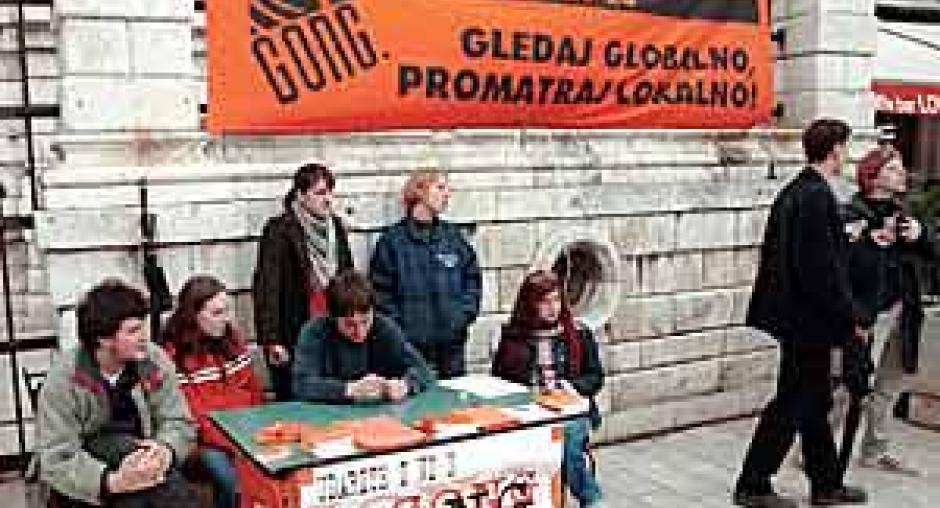Newsroom
OSCE Mission concerned about low voter turnout at minority elections in Croatia
ZAGREB 19 May 2003

(GONG)GONG, a domestic NGO funded by the OSCE, disseminates information for minority council elections in Croatia on 18 May 2003. (GONG) Photo details
ZAGREB, 19 May, 2003 - The OSCE Mission to Croatia has expressed concern today about the low turnout at elections for minority councils held in Croatia on Sunday and urged the Government to organize additional elections in areas where they were not held.
The Head of the OSCE Mission to Croatia, Ambassador Peter Semneby, says the elections were conducted in an open and well-organized fashion, however the low voter turnout could negatively impact their legitimacy.
"We urge the Government to organize additional elections in areas were elections were not held and assist minority associations in ensuring a higher turnout next time" Ambassador Semneby said. "This would be facilitated by giving a longer lead time in which the elections could be prepared and by supporting the information and campaign efforts by minority associations."
Elections were held for fewer than half of the 470 councils and 140 representatives to which minority groups were entitled (respectively 221 councils and 42 representatives).
Reports by GONG, the non-governmental organization (NGO) supported by the OSCE to promote and observe the elections, confirm the Mission's observations.
The elections are a key step in the implementation of the Constitutional Law on the Rights of National Minorities, which was adopted last December and welcomed by the OSCE, the EU and other international organizations.
"The Government should also take immediate steps to implement overdue local and regional elections - originally scheduled to take place by 23 March 2003 - to ensure adequate representation for minorities in local and regional government, as provided by the Constitutional Law on the Rights of National Minorities," Ambassador Semneby said.
The Head of the OSCE Mission to Croatia, Ambassador Peter Semneby, says the elections were conducted in an open and well-organized fashion, however the low voter turnout could negatively impact their legitimacy.
"We urge the Government to organize additional elections in areas were elections were not held and assist minority associations in ensuring a higher turnout next time" Ambassador Semneby said. "This would be facilitated by giving a longer lead time in which the elections could be prepared and by supporting the information and campaign efforts by minority associations."
Elections were held for fewer than half of the 470 councils and 140 representatives to which minority groups were entitled (respectively 221 councils and 42 representatives).
Reports by GONG, the non-governmental organization (NGO) supported by the OSCE to promote and observe the elections, confirm the Mission's observations.
The elections are a key step in the implementation of the Constitutional Law on the Rights of National Minorities, which was adopted last December and welcomed by the OSCE, the EU and other international organizations.
"The Government should also take immediate steps to implement overdue local and regional elections - originally scheduled to take place by 23 March 2003 - to ensure adequate representation for minorities in local and regional government, as provided by the Constitutional Law on the Rights of National Minorities," Ambassador Semneby said.
